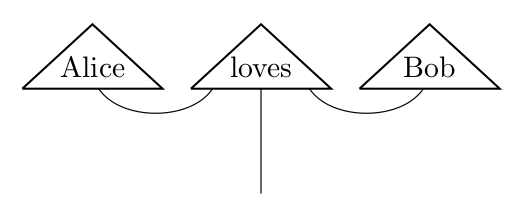https://github.com/mroman42/discokitty
An educational implementation of some aspects of the DisCoCat framework
https://github.com/mroman42/discokitty
category-theory discocat distributional-semantics
Last synced: 2 months ago
JSON representation
An educational implementation of some aspects of the DisCoCat framework
- Host: GitHub
- URL: https://github.com/mroman42/discokitty
- Owner: mroman42
- License: gpl-3.0
- Created: 2019-05-01T15:29:32.000Z (about 6 years ago)
- Default Branch: master
- Last Pushed: 2023-03-17T10:09:37.000Z (about 2 years ago)
- Last Synced: 2024-10-17T21:35:18.511Z (7 months ago)
- Topics: category-theory, discocat, distributional-semantics
- Language: Haskell
- Homepage:
- Size: 116 KB
- Stars: 9
- Watchers: 4
- Forks: 0
- Open Issues: 0
-
Metadata Files:
- Readme: README.md
- License: LICENSE
Awesome Lists containing this project
README
# discokitty

An educational implementation of the DisCoCat framework as described
in *"Mathematical Foundations for a Compositional Distributional Model
of Meaning"* ([link](https://arxiv.org/abs/1003.4394)) by Coecke,
Sadrzadeh and Clark.

*[Sunglasses Kitty](https://thenounproject.com/Gilleas/collection/kitty-emoticons/?i=359412#)
by Rikki Lorie, licensed under Creative Commons*
- [Distributional models of meaning. Semantical, grammatical, and moral ambiguity](https://www.cs.ox.ac.uk/people/bob.coecke/DMM_Mario.pdf). Mario Román, under the supervision of Bob Coecke (2019).
## Usage example
Please note that this library is work in progress and it is possible
that substantial changes will be made. In the following example we
work in the category of relations declaring the meaning and grammar
type of some words and then we evaluate an example sentence.
``` haskell
module Discokitty.Examples.AliceAndBob where
import Discokitty
import Discokitty.Models.Diagrams
import Discokitty.Models.Rel
-- We first declare an universe with all the possible basis words,
-- both nouns and sentences. The rest of the types are parameterized
-- by this universe.
data Universe = Alice | Bob | IsTrue | IsFalse deriving (Eq, Ord, Show)
-- We choose to use the category of relations for this example, and we
-- declare a term to be a word in the category of relations for our
-- given universe.
type Term = Words (Rel Universe)
-- We give meaning to some terms. Relations are described as subsets using
-- "relation", and the Lambek grammatical type must be written at the end.
alice :: Term
alice = Words
{ meaning = relation [ [ Alice ] ]
, grammar = [N]
, text = "Alice"
}
bob :: Term
bob = Words
{ meaning = relation [ [ Bob ] ]
, grammar = [N]
, text = "Bob"
}
loves :: Term
loves = Words
{ meaning = relation [ [ Alice , IsTrue , Bob ] ]
, grammar = [ L N , S , R N ]
, text = "loves"
}
-- In our example sentence, we evaluate "Alice loves Bob".
-- This produces the following output:
-- > [[IsTrue]] of grammar type [S]
example :: [Term]
example = sentence [alice , loves , bob] @@@ [S]
-- We can also generate Tikz diagrams.
exampleDiagram :: String
exampleDiagram = tikzDiagrams [alice , loves , bob]
```
The generated tikz diagram looks as follows.
